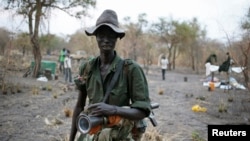JUBA —
A county commissioner in South Sudan's Jonglei state has called for urgent help from international aid agencies after he received reports that villagers are dying of starvation in parts of the county.
“The hunger is very severe. People are dying because of the hunger. They have nothing to eat. Even in the shops and the markets, there is nothing that you can buy,” Twic East County Commissioner Dau Akoi Jurkuch said.
Officials in the county are still working to establish the exact number of fatalities from hunger, Jurkuch said.
He blamed the severe food shortages on a combination of flash floods during last year's growing season, which washed away large swathes of edible crops, and the deadly violence that has raked South Sudan for nearly eight weeks
To make matters worse, thousands of people who fled the state capital, Bor, some 75 miles (120 kiklometers) away, as pro- and anti-government forces fought for control of it, headed to Twic East. Aid workers left the area completely as the fighting raged.
Further exacerbating the county's problems, the presence of an anti-government base just outside Twic East has made traders who used to sell food in the county in northern Jonglei state too frightened to travel there.
Jurkuch appealed to humanitarian groups to return to the region and distribute emergency food rations to save lives.
“I want to appeal to NGOs and humanitarians that have been working in Twic East and also any other humanitarians that can assist this population because of the hunger and any other services that can be provided,” he said.
According to the United Nations Office for the Coordination of Humanitarian Affairs (OCHA), 70 percent of Jonglei state's population of 1.7 million, or 1.19 million people, are severely food insecure.
The United Nations appealed last week for $1.27 billion to help its agencies and NGOs to strategically position aid supplies for delivery before the start of the rainy season, usually in March.
Jurkuch said flood waters from last year still have not fully subsided in some villages in Twic East, posing yet another danger to locals: diseases.
"There are issues of malaria, there are issues of diarrhea, there are issues of common cold," he said.
"There are people who are sick because there are no drugs in the hospitals and there are no drugs in clinics. So people are just staying like wild animals," he said.
“The hunger is very severe. People are dying because of the hunger. They have nothing to eat. Even in the shops and the markets, there is nothing that you can buy,” Twic East County Commissioner Dau Akoi Jurkuch said.
Officials in the county are still working to establish the exact number of fatalities from hunger, Jurkuch said.
He blamed the severe food shortages on a combination of flash floods during last year's growing season, which washed away large swathes of edible crops, and the deadly violence that has raked South Sudan for nearly eight weeks
To make matters worse, thousands of people who fled the state capital, Bor, some 75 miles (120 kiklometers) away, as pro- and anti-government forces fought for control of it, headed to Twic East. Aid workers left the area completely as the fighting raged.
Further exacerbating the county's problems, the presence of an anti-government base just outside Twic East has made traders who used to sell food in the county in northern Jonglei state too frightened to travel there.
Jurkuch appealed to humanitarian groups to return to the region and distribute emergency food rations to save lives.
“I want to appeal to NGOs and humanitarians that have been working in Twic East and also any other humanitarians that can assist this population because of the hunger and any other services that can be provided,” he said.
According to the United Nations Office for the Coordination of Humanitarian Affairs (OCHA), 70 percent of Jonglei state's population of 1.7 million, or 1.19 million people, are severely food insecure.
The United Nations appealed last week for $1.27 billion to help its agencies and NGOs to strategically position aid supplies for delivery before the start of the rainy season, usually in March.
Jurkuch said flood waters from last year still have not fully subsided in some villages in Twic East, posing yet another danger to locals: diseases.
"There are issues of malaria, there are issues of diarrhea, there are issues of common cold," he said.
"There are people who are sick because there are no drugs in the hospitals and there are no drugs in clinics. So people are just staying like wild animals," he said.





